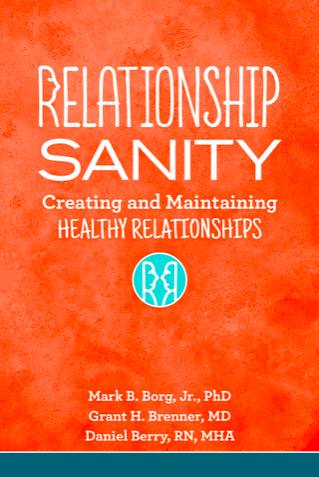AVAILABLE NOW
How to understand the human experience, and learn to love ‘your crazy.’
“An eye-opening journey where your most shameful vulnerabilities are explored and transcended in the process of ‘making your crazy work for you.’ A must read!”
Making Your Crazy Work For You: From Trauma and Isolation to Self-Acceptance and Love
Mark B. Borg, Jr. PhD; Grant H. Brenner MD; Daniel Berry RN MHA
From the authors of the Irrelationship series comes an insightful guidebook for enhancing the most vital relationship in every person's life―the one they have with themselves.
Making Your Crazy Work for You adopts the irrelationship model to present a step-by-step program for self-understanding and catalyzing change. Our "crazy" refers to our unique reaction to our own pain, fear, and anxiety brought on by isolation from others and ourself. This unrecognized isolation can occur even when we are surrounded by other people in our daily lives. However, by learning to listen to our craziness, we can use it as a tool for ending isolation and opening up to love.
Drawn from the authors' experience in clinical practice, each chapter features new case studies, exercises, and tools to help readers to reverse unhealthy behavior patterns; learn to access their genuine emotions, needs, and ideas; and create better relationships.
“Childhood, for most of us, was a trauma from which we may not yet have recovered nor yet understand, which these brilliant authors call ‘Your Crazy.’ In this scintillating book, you will find not only the source of this almost universal condition but an explanation of what it is and what you can do to move from ‘crazy’ to ‘sanity.’ We commend their compelling solution and recommend this book to everyone who may have suffered trauma or who wants to understand others who have.”
“A phenomenal book about how our human experience of loss and grief bonds us more than we think. The authors draw from different disciplines, illuminating how our early experiences and the hurts they have caused can lead to a fragmented sense of self. We learn how to re-integrate these pieces back into our lives with patience, love, compassion, and understanding. We do this so that we can feel whole again, and maybe only to learn that we were never actually broken in the first place. This book is a must read for those who want to live a little lighter. I know I do!”
“This book masterfully explains how to turn your crazy into a tool that can help enhance your personal and professional relationships. We all have some crazy in us! Why not benefit from your crazy? This book will teach you how.”
THE IRRELATIONSHIP SERIES
About the Authors
Who we are
The Irrelationship Group LLC was founded to assist people in developing fulfilling intimate relationships through education, self-help, and facilitation. TIG was started by three healthcare professionals in order to assist people in understanding themselves by understanding how they become engaged in dysfunctional relationships, termed "irrelationship". We offer approaches to disentangle oneself from irrelationship through the cultivation of compassionate empathy, mutuality and self-awareness.
Mark B. Borg, Jr., Ph.D. is a community and clinical psychologist and a psychoanalyst practicing in New York City. He is founding partner of The Community Consulting Group, a consulting firm that trains community stakeholders, local governments and other organizations to use psychoanalytic techniques in community rebuilding and revitalization. He is a supervisor of psychotherapy at the William Alanson White Institute and has written extensively about the intersection of psychoanalysis and community crisis intervention. He has published numerous articles and book chapters on community intervention, organizational consultation, psychoanalytic therapy; and on the application of psychoanalytic theory and technique to improve and streamline the process of community crisis intervention.
Grant H. Brenner, MD is a psychiatrist in private practice in New York City, specializing in treating mood and anxiety disorders and the complex problems arising from developmental childhood trauma. He works from a humanistic and integrative perspective, incorporating evidence-based approaches as well as innovative techniques such as transcranial magnetic stimulation (TMS) and neurofeedback. He is on the faculty of the Mount Sinai Beth Israel Hospital, Director of Trauma Service at the William Alanson White Institute and a volunteer and Board member of the not-for-profit Disaster Psychiatry Outreach. He is an author and editor of the book Creating Spiritual and Psychological Resilience: Integrating Care in Disaster Relief Work, and has published a number of book chapters and papers.
Daniel Berry, RN, MHA has practiced as a Registered Nurse in New York City since 1987. Working in in-patient, home care and community settings, his work has taken him into some of the city’s most privileged households as well as some of its most underserved and dangerous public housing projects in Manhattan and the South Bronx. He is currently Assistant Director of Nursing for Risk Management at a public facility serving homeless and undocumented victims of street violence, addiction and traumatic injuries. In 2015 he was invited to serve as a nurse consultant to a United Nations-certified NGO in Afghanistan that promotes community development and addresses women’s and children’s health issues.
What is an irrelationship?
An irrelationship is a two-person psychological defense system; it is a defense against the fear and anxiety that come along with allowing another person to matter. Irrelationship is a way of protecting those within it from the messy business of really relating, because while intimate connections promise caring, compassion, and empathy, they also require emotional investment and risk. Irrelationship is not a syndrome, an illness, or a pathology. It is a way of being in relationship, a dynamic—something partners do together.











